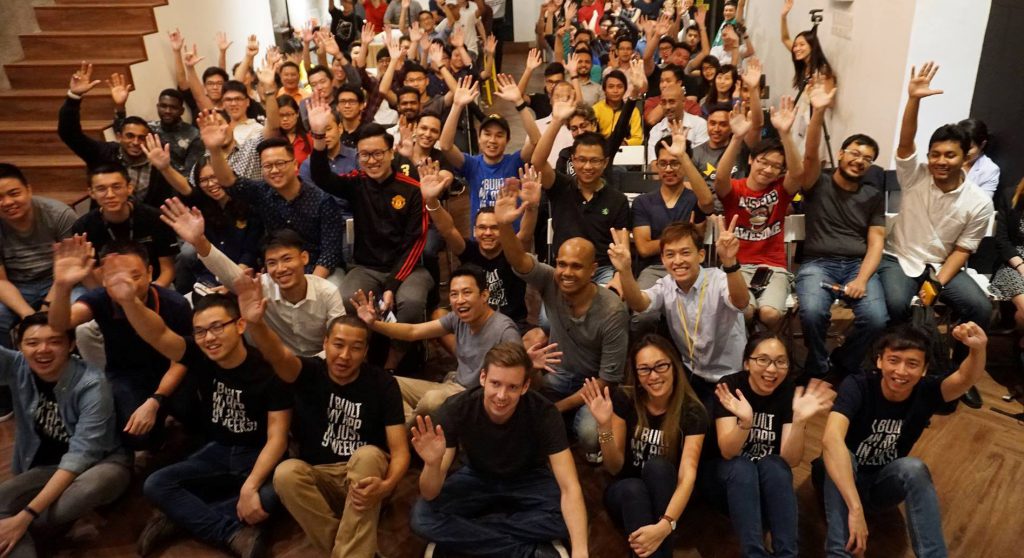Last week at Next Academy‘s coding bootcamp project showcase, 6 teams came together to present apps they’d developed after 9 intensive weeks of learning to code. They had just a single week to move from ideation to building the actual projects. All the apps are minimum viable products, meaning that they are usable and have all the basic features.
Speaking to the teams, I found that more than 50% of them went into the bootcamp with little or zero prior coding experience. This means that in a little over 2 months, they picked up coding and could build their own web or iOS apps, a very heartening reminder that learning to code may not be as difficult or as time consuming as some might think.
With the theme “Hacking Lifestyle”, these are the 6 apps that the teams came up with.
1. Kill Bill

A bill reminder app to keep all our bills in one place, the team did a good job in keeping the design simple and easy to navigate. You’re able to set notifications of when the bills are due, snap pictures of paper bills so that they’re on record to be kept in one place, and see your total amount spent on bills for the month.
In itself, this doesn’t make it very different from other bill management apps already available, but the team doesn’t plan to leave it just there. They want to eventually integrate a bill payment feature into this which would make the app extra useful, if they can get all the relevant companies on board. Perhaps a feature where the bills are just sent directly to the app would be good, to save the user even more trouble.
2. Boro

There are times you need certain items, but you don’t want to spend too much on buying them when you’ll only need them once. Take for instance, a drill for when you’re newly moved in and you want to do some quick work putting things up.
Boro’s concept is that you can rent items to and from people in your neighbouring community. One particularly nice feature is being able to borrow “sets” of items, such as for camping, or for painting a house or even snowboarding. Bundling everything up together makes things much easier, and I can definitely see this concept taking off if they can get more people on board.
3. Cast

Cast’s goal is to connect visual artists to collaborate on projects. The teams hopes that this will build a community of photographers and models that will be able to easily find each other when they need to. This app is also meant to help those who want to have photoshoots to feature their products, but don’t want to go through agencies which may drive up the cost.
Features include an in-app chat function, notifications when others are interested in collaborating with your project and different categories/specialties.
Cast is actually available for download on the Apple App store, so you can check it out for yourself.
4. Kampy

Kampy is an app made with parents in mind, allowing them to find activities to do together with other parents and children nearby. Parents can get suggestions by browsing a map of nearby events, and there is also a rating system that will help keep the event posters and users alike accountable.
Some suggestions raised during the pitch was to not limit this platform to just parents. After all, quite a lot of single adults without children are also at a loss for what to do during weekends, and this would open up the market range for Kampy.
5. Team Up

The concept of Team Up sounds fairly similar to Sportify, an app that allows you to find others to be part of your sports game, or to join existing games that have already been set up. To further develop their app, they hope to eventually bring in courts and sports facilities to ease the booking process.
One of the strengths of Team Up is the in-app rating system. To prevent abuse, every time you “upvote” someone, you get an upvote too, but if you “downvote” someone, you also lost a point. A user who has accumulated more points will be seen as more active and trustworthy. You can also endorse someone’s listed sports skills, somewhat similar to the endorsement feature on LinkedIn, so other users don’t just have to take one person’s self-reported level at face value.
6. Project Z

Project Z is a multiplayer geolocation-based zombie game, so the “Hacking Lifestyle” theme comes in because it gets you to go out and exercise, but have fun at the same time.
Like Pokémon GO, you have to move around in the real world to get your in-game avatar moving too. Every time you load up the game, you have to complete a mission in the form of collecting a pack that is randomly spawned in a location near you. However, there are zombies on the map that you will have to avoid and that will chase you if they spot you. Getting caught means that you fail at your mission.
The team hopes to incorporate extra features like different zombie classes (that will affect the speed the zombies move) and also different user classes (that will give you special powers to help you progress). The concept sounds fun, but like Pokémon GO before it, will they be able to retain users once the novelty of playing wears off? Only time will tell.











